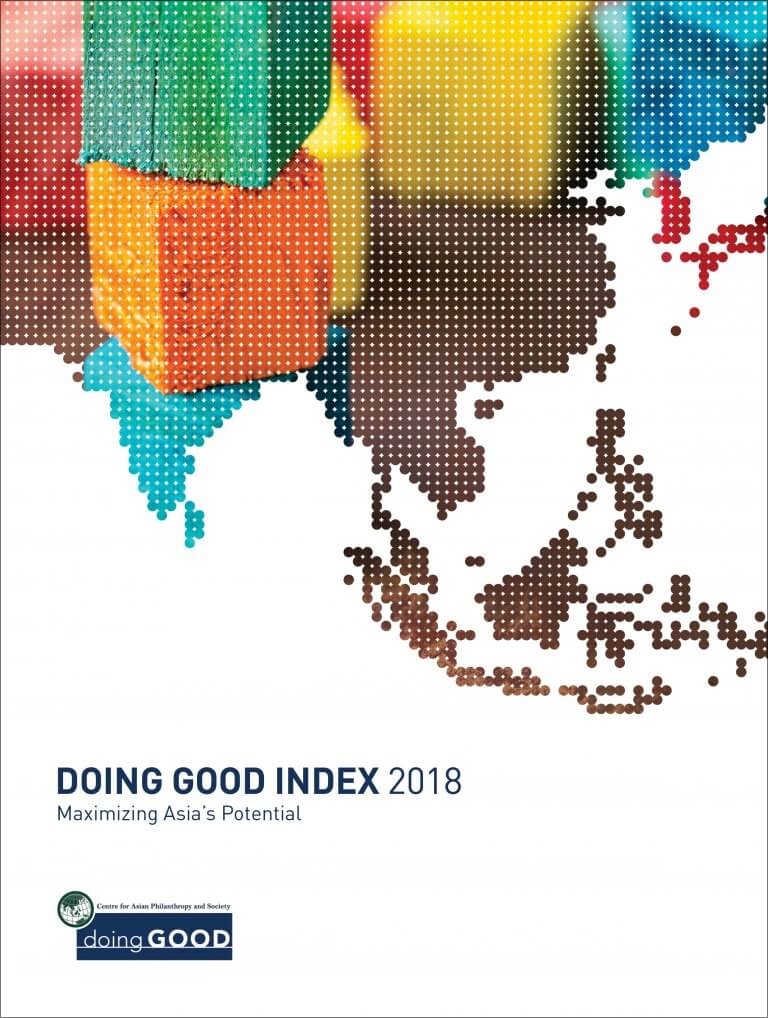Imagine this: a future for Asia where everyone can achieve their potential and live in prosperity, free from risks to their health or the destitution of poverty.
The Sustainable Development Goals (SDGs) set ambitious targets for global socioeconomic development, and the annual price for reaching these goals globally by 2030 is estimated at USD $1.4 trillion dollars.
In an age of a changing climate and a rapidly growing population, unlocking all available resources to help us reach these goals becomes an imperative of survival.
 The Doing Good Index, charts the path for eliciting the maximum potential resources and efficacy of the social sector in Asia.
The Doing Good Index, charts the path for eliciting the maximum potential resources and efficacy of the social sector in Asia.
It is a benchmark survey of more than 1,500 non-profits and 80 in-country experts across 15 economies in Asia.
It offers a framework approach for improving philanthropy infrastructure, and unlocking socioeconomic development capital across Asia.
The Doing Good Index proposes that with the right policy reforms, Asia could achieve the same volume of philanthropic giving as the United States: 2 per cent of GDP.
If South Asia, East-Asia and Pacific countries achieve this, it would mean more than USD 507 billion per year, dwarfing the USD 45 billion of Official Development Assistance reaching continental Asia from around the world each year, and equaling more than one-third of the annual cost for reaching the SDGs.
Non-profit organizations providing social services and aiding economic development are essential stakeholders and progress drivers for achieving the SDGs.
The efficacy of their work and the regulatory infrastructure needed to facilitate the giving and receiving of philanthropic funds are critical therefore, and the subject of this major study.
What makes NGOs in Asia unique?
Coming through long and individual histories of philanthropy, Asian societies have developed unique norms and organizations supporting the altruistic (and often pragmatic) assistance to those in need.
However, more than a quarter of the surveyed economies in Asia are finding increasing uncertainty in the nonprofit operating environment on account of changes in government attitudes towards the sector, one indication being the new blockades on receipt of social investment funds from abroad.
Despite these challenges, most economies across Asia show positive signs of society’s engagement with the social sector.
This can be seen through the financial support to the sector coming from locally-based donors and government bodies, as well as 60 per cent of organizations reporting cooperative work with corporations and 88 per cent receiving volunteers.
The state of government action or inaction to open the floodgates of philanthropic funds varies across the region.
The rates of tax deduction for donations range from Singapore’s 250 per cent to Myanmar’s 0 per cent, and there is a wide range of experiences in the ease of setting up a nonprofit.
Accountability is a widely-identified concern, and annual reporting requirements enshrine some accountability organizations, but they are limited in scope and implementation. Communication of regulations pertaining to the nonprofit sector occurs, but almost half of the surveyed organizations find the regulatory environment far from easy to understand.
Why this report matters
This study is of unique relevance for more than knowledge-seeking philanthropists. For directors in international NGOs opening offices or partnering with local NGOs in Asia the Doing Good Index helps you evaluate where its best to base your regional hubs and where you can enjoy supportive relationships with government and local communities. You’ll learn about your local partners, how they’re governed, and how they’re perceived locally.
For humanitarian and nonprofit professionals, you’ll learn the mechanisms governments are using to steer the nonprofit sector and reassert government influence over the agenda of aid inflows.
Likewise, discover shortcomings of nonprofit sector actors across Asia, and the support needed to improve their standing with government and society at large.
The Doing Good Index is a milestone achievement in the development of knowledge on social service delivery and nonprofit organizations in Asia. No future assessment of the philanthropic space and opportunities in Asia is complete without referencing this seminal study.
Virgil Haden-Pawlowski is a Senior Researcher at the Centre for Asian Philanthropy and Society, Hong Kong.





Comments (0)